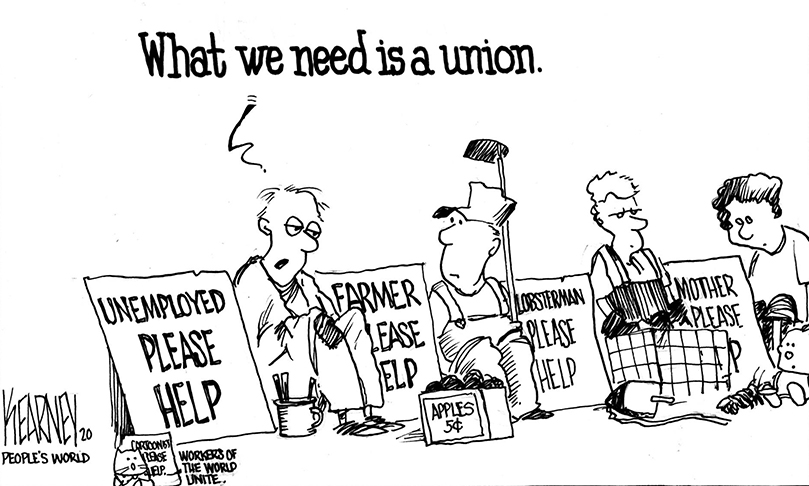
A lot of hope—and rightly so—is being placed in what a post-Trump country and world might look like. And yes, almost anything would be better. (As a popular lawn sign reads, “2020: Any Functioning Adult.”) Proposals for union-friendly organizing rights, student debt relief, a wealth tax, a green infrastructure bill (if not a Green New Deal), a rejoining of the Paris Climate Accord undertaken by a new administration would allow most everyone to breathe a sigh of relief. And breathing, in light of the 90,000 plus dead in this COVID-19 crisis, is not a thing to be taken for granted.
The scale and intensity of the crisis, however, and the public’s response to it, will determine what’s needed, party planks now contemplated be damned. With unemployment today at 25 percent or more, the shock to the capitalist system is profound. With a 3-to-1 ratio of African American and Latino to whites deaths, the racial implications are clear. Some, recalling William Patterson’s formula, that when are government is aware of the implications of its policy but does nothing, the result is genocidal. Overcoming these factors will be no small feat. But the question looms: how will this “overcoming” be defined?
International supply chains, for example, have been disrupted and with them perhaps the whole model of just-in-time production. There are now growing calls to bring parts production back home, and rightly so. What that will mean with respect to imperialist globalization is unclear. But it’s not a given that resuming domestic manufacturing will result in job creation. At least that’s the considered opinion of Columbia University professor and Nobel Prize–winning economist Joseph Stiglitz in a recent interview. In his view, potential workers in newly constructed factories will be replaced by robots. In fact, Stiglitz says, the trend toward deindustrialization and a service economy will only deepen.
Big sections of the economy may be radically reshaped. Airlines, for example, along with nursing homes, theaters, restaurants, retail outlets, meatpacking factories, indeed, anything and everything that was done in confined spaces are in for a severe retrofitting. Facebook, Twitter, and Microsoft are fast forwarding work-from-home alternatives, with possibly half of their employees working remotely in a decade.
Surprisingly, even the healthcare industry has been affected, experiencing the second largest job loss in April. According to some, 42 percent of all the current jobs lost will not be replaced.
The country is in the midst of a profound systemic crisis of capitalism.
The very future of work, already subject to restructuring by artificial intelligence, big data, and robotics, has not-too-certain prospects, particularly in light of predictions by Larry Summers, a current advisor to the Biden campaign.
Summers foresees a dramatic downsizing in general, with the airline industry being a case in point. Dismissing subsidizing employers to maintain current payrolls, the former Obama White House official remarked, “What conceivable logic is there to tell Delta Airlines that it has to retain every employee until October 1st? Delta airlines is years away from needing to retain the number of flight attendants that it has now. And there’s zero probability to want to have those flight attendants back.”
Summers went on to call for a strategic market-based culling. “Why does New Haven need 10 Indian restaurants when it only needs 4?” he asked.
The depth of the current crisis, which Summers thinks is at least twice if not three times as severe as the Great Recession, may also threaten the banking system. Stress tests, aimed at measuring a bank’s viability in times of crisis, he argues, are not credible. If Summers is right, Wall Street may be in big trouble.
There’s no going back to the way things were.
Importantly, both economists see the need for generous financial support for unemployed workers in the near term, with Summers arguing that the best stimulus lies in financing health care. But what will happen down the road? Here the two accept that there’s no going back to the way things were in terms of employment levels. Translated, that means the working class one way or another is going to pay the heaviest price.
Are there alternatives? Apparently not, if you’re stuck within the framework of liberal or neoliberal thinking. On the other hand, Jared Bernstein another economic advisor to the vice president say that the presumptive nominee “recognizes the need for an “urgent expansion” that better insulates the American economy from the “shocks that are coming fast and furiously” not as a direct result of the pandemic but from climate change and income inequality.”
Pressure is also coming from trade unions and progressive elected officials. Still demands for shortening the work week, socializing the hospital system or other industries, cancelling all debt—a debt jubilee—radically cutting the military budget, etc., so far have not entered the conversation. And they won’t, without mass public pressure and protest from the very ones most affected by the crisis—the growing army of the unemployed and their unions.
But it’s going to take more than public pressure. Along with such pressure, in fact by means of it, the balance of power in the country must be changed.
At this stage, a new Democratic administration is the only alternative to Trump’s neo-fascist impulse, even if the measures now proposed inadequately address what’s coming. However, for that door to be opened, even partly, the door to the Trump White House must be firmly and completely closed and the current occupant thrown out.
Can we advance if we fear to advance toward socialism?
Clearly, in light of the prognostications of some of the Democrats’ chief economists, the post-November political battlefield will be the site of intense class and democratic struggle. There are but two paths to solve the crisis—either on the backs of the rich or on the backs of the poor. In other words, it’s going to mean either more capitalism or more socialism. Can advances be made without massive public investments in health care, education, infrastructure, industry, housing, and science? Can we really advance if we fear to advance toward socialism?
A lot will depend on what happens in the Congressional elections as well. Recall that in 2008 Democratic majorities in the House and Senate could not prevail in the battle for a larger stimulus.
The crisis today however, is on another scale of magnitude and the caring-for-each-other sentiments, a material force brought to the fore by the pandemic, give us much to build on. In this regard, Joel Wendland writes,
The interventions that have been undertaken, reliance on science, mobilization of public spirit of commitment and sacrifice, the re-organization of activity into necessary and essential services, the sense of solidarity and shared work toward the goal of resolving the crisis, the calls for re-directing production to needed goods, the immediate expansion of aid to workers in the form of extended unemployment, the provision of free test and care for victims of the pandemic, all serve as models for a socialistic model of democratic planning, expansion of publicly operated services for need not for commercial value, and economic waste.
He continued, “For example the collapse of oil markets and finance capital reveal how little we benefit from the existence of those sectors or how little we are harmed when they fall apart. The increased hostility toward price gougers and profiteers could translate into policy.”
In this broad democratic and socialist moment, the sole force capable of seeing this through are the workers and people most affected by the crisis. They, along with the broader movement that brought the new House of Representatives to power in the midterms must give leadership to the fight.
It’s time to, as Bobby Seale once said, “seize the time.”


 Join Now
Join Now